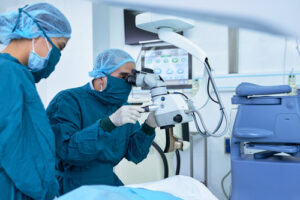Cataract surgery can make a profound difference in your life. Where it may have felt like you were permanently looking through a frosted window, cataract surgery can return clarity to your vision.
If you’re considering cataract surgery or already have it scheduled, you may be wondering whether cataracts can be a recurring issue. The last thing you want is for your cataract to return and cause more trouble.
Keep reading to find out if cataracts can come back after you have cataract surgery!
How Does Cataract Surgery Work?
Cataract surgery is the most common type of eye surgery. Every year, about ten million cataract removal procedures are performed worldwide.
Cataract surgery in Kingston, New York, is incredibly safe and effective. It also has a high success and satisfaction rate.

When you have a cataract, the lens of your eye becomes clouded. This prevents light from reaching the retina at the back of your eye, resulting in blurred images.
Cataracts are most commonly found in people who are forty and older due to natural age-related changes in the eye. In addition to blurry vision, cataracts can result in light sensitivity, glare, double vision in one eye, and trouble seeing at night.
They may also cause fading or yellowing of colors, a need for brighter light during up-close activities, and a need to frequently change your prescription. Cataracts progress slowly, so symptoms worsen over time and may not even be noticeable at first.
The only way to get rid of a cataract is to remove the entire lens where the cataract is. Cataract surgery is generally recommended when the cataract progresses far enough that it becomes a daily nuisance and affects your ability to complete regular tasks.
During the surgery, the natural lens is replaced with an artificial one that is clear and restores your vision. This artificial lens is called an intraocular lens, or IOL.
It allows your eye to focus light as it should. Advanced IOLs can improve your vision beyond just removing a cataract and even allow you to live free of glasses or contacts.
Following surgery, most people notice an improvement in their vision within a couple of days. Total healing can take about eight weeks.
Can Cataracts Return After Cataract Surgery?
No, cataracts cannot return after cataract surgery. Once the natural lens is removed and replaced with an artificial lens, the cataract cannot grow back, and another cannot develop.

Because your natural lens is removed during surgery, it is not possible for the cataract to return. A cataract can also not form on an IOL.
This is because cataracts are formed by the breakdown and clumping together of proteins in the eye. A synthetic lens does not contain proteins.
This means you will never have to worry about a cataract returning after you have it surgically removed. You will also not need additional surgery to eliminate the same cataract again. After cataract surgery, you can say goodbye to your cataract for good!
What Is PCO?
While cataracts cannot return after cataract surgery, some people develop a similar condition called PCO after surgery. PCO stands for “posterior capsular opacification.”
PCO is sometimes referred to as secondary cataracts. However, this term is really a misnomer, as it is not a cataract.
PCO is another form of clouding. While it is different from cataracts, it does present with similar symptoms.

Typical symptoms of PCO include:
- Blurry vision
- Glare and halos around light sources
- Light sensitivity
- Difficulty with up-close tasks, like reading
As with a cataract, PCO prevents light from passing through the eye properly. This is what makes your vision blurry.
PCO does not mean that your cataract has returned. PCO is scar tissue that forms on your lens capsule.
Your lens capsule is the ordinarily thin and transparent membrane that surrounds the area in which your lens sits. It keeps your lens in position.
PCO develops when lens cells left over from surgery move and grow scar-like tissue on the capsule. This thickens and clouds the capsule.
Some factors can increase your risk of developing PCO. These include diabetes-related retinopathy, glaucoma, and a rare inflammatory condition called uveitis.
PCO can take months or even years to develop. It is the most common complication of cataract surgery, but luckily it is easily treatable.
How is PCO Treated?
A simple procedure called YAG laser capsulotomy can restore clear vision affected by PCO. Just like cataract surgery, this is an outpatient procedure.

It only takes a few minutes to complete. During a YAG laser capsulotomy, a laser is used to remove a small part of the clouded capsule.
This allows light to pass through properly again. Clear vision typically returns within a day.
Is a cataract giving you trouble, or do you have any questions about cataract surgery? Schedule an appointment at Cheema MD Eye Care in Kingston, NY, today!



